Haiti protesters stoke political crisis while powers seek consensus
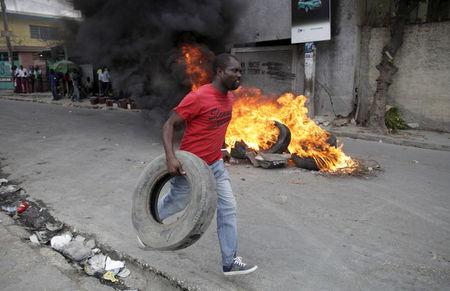
PORT-AU-PRINCE (Reuters) — Stone-throwing protesters stoked Haiti's political crisis on Saturday, a day after they forced the Caribbean nation to call off a presidential election and despite calls for consensus from global powers.
Haiti was due to choose a replacement for President Michel Martelly in a runoff vote on Sunday, but the two-man race was postponed indefinitely after opposition candidate Jude Celestin refused to participate on alleged fraud that spread anti-government protests and violence nationally.
Martelly says the fraud claims are unfounded but critics believe he unfairly favored his chosen successor, banana exporter Jovenel Moise, and some are demanding that Haiti, the poorest country in the Western hemisphere, start its $100 million election again from scratch.
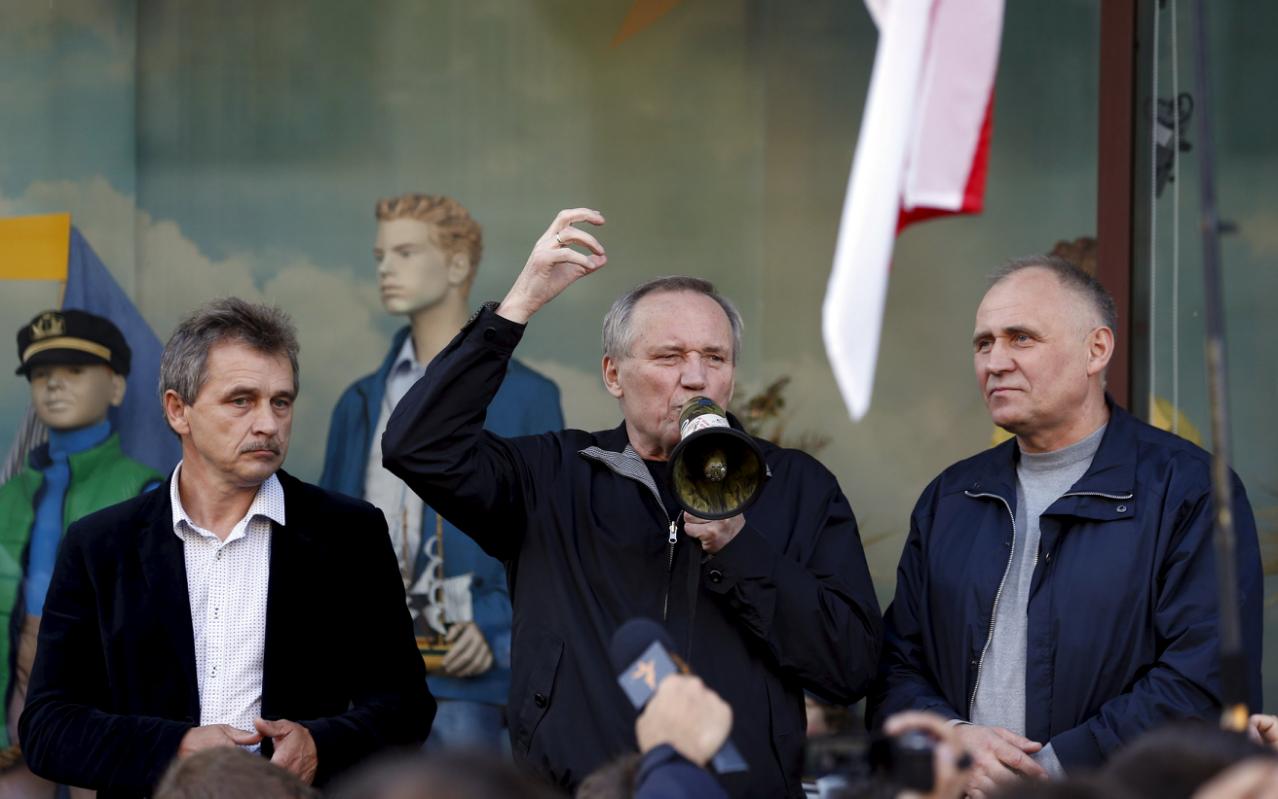
Belarussian opposition leaders Vladimir Neklyayev (C), Nikolai Statkevich (R) and Anatoly Lebedko talk about the upcoming presidential elections with people in central Minsk, September 10, 2015. The Belarussian presidential election is scheduled to be held on October 11, 2015. REUTERS/Vasily Fedosenko
Striking a defiant note, Moise criticized the election council for postponing a vote he was confident of winning, and said he was ready to stand whenever a new date was set.
The United Nations joined the United States and other major powers that had supported the election in denouncing the violence and calling for a negotiated solution that leads to a new vote.
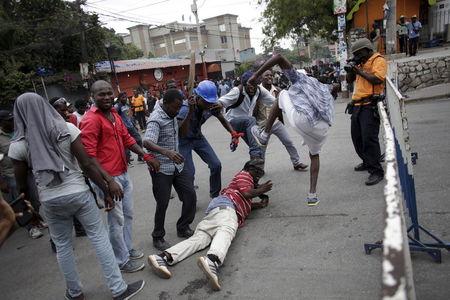
Protesters, who were mocking National Police officers (not pictured), simulate a beating during a demonstration against the electoral process in Port-au-Prince, Haiti, January 22, 2016. REUTERS/Andres Martinez Casares
About a thousand protesters snaked through capital Port-au-Prince's downtown, a district still largely in ruins after a devastating 2010 earthquake. Some flung rocks and burnt tires, others beat a man alleged to be a thief.
Soldiers from Haiti's U.N. peacekeeping mission patrolled the streets in white armored vehicles at sundown.
Martelly is due to leave office in two weeks and Haiti may need an interim body to see the country through to the next election, but he and different opposition leaders will struggle to agree on the contours of such an administration.
Haiti has been unable to build a stable democracy since the overthrow of the 1957-1986 dictatorship of the Duvalier family and ensuing military coups and election fraud.
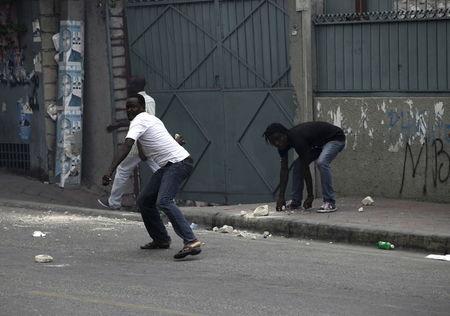
Protesters throw rocks to National Police officers during a demonstration against the electoral process in Port-au-Prince, Haiti, January 22, 2016. REUTERS/Andres Martinez Casares
Drawn from the capital's poorest neighborhoods, the protesters deeply oppose Martelly's business-friendly reign, which they say was artificially propped-up by foreign powers.
They believe that with him out the way, there will be a better chance of electing a president who will champion the poor.
"We demand the departure of Martelly before Feb. 7," said Volcy Assad, a protest leader and an aide of Moise Jean-Charles, the third-place candidate in the October round who believes he was cheated of victory.
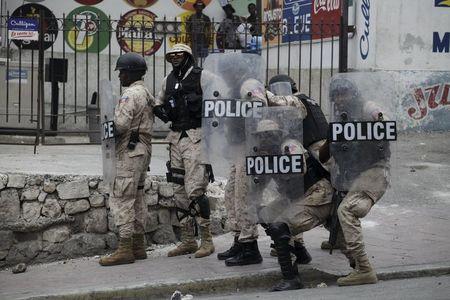
National Police officers protect themselves from rocks thrown by protesters during a demonstration against the electoral process in Port-au-Prince, Haiti, January 22, 2016. REUTERS/Andres Martinez Casares
"We want a transitional government to set up an investigation commission that will determine the sincerity of the elections," Assad said.
Assad's Platform Pitit Dessalines party and others with links to former President Jean-Bertrand Aristide's left-wing movement are prepared to see both rounds of the election annulled, giving themselves another shot at the presidency.
Second-place Celestin, on the other hand, is likely to want to maintain his advantage and quickly organize a clean runoff vote.
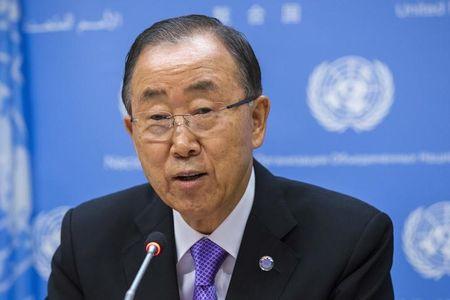
United Nations Secretary General Ban Ki-moon addresses the media ahead of the U.N. General Debate at U.N. headquarters in New York September 16, 2015. REUTERS/Lucas Jackson
"We are very encouraged by the decision to postpone the election. We hope that everything will be put in place to have credible elections as soon as possible,".
Opposition leaders of all stripes said the protests would continue.
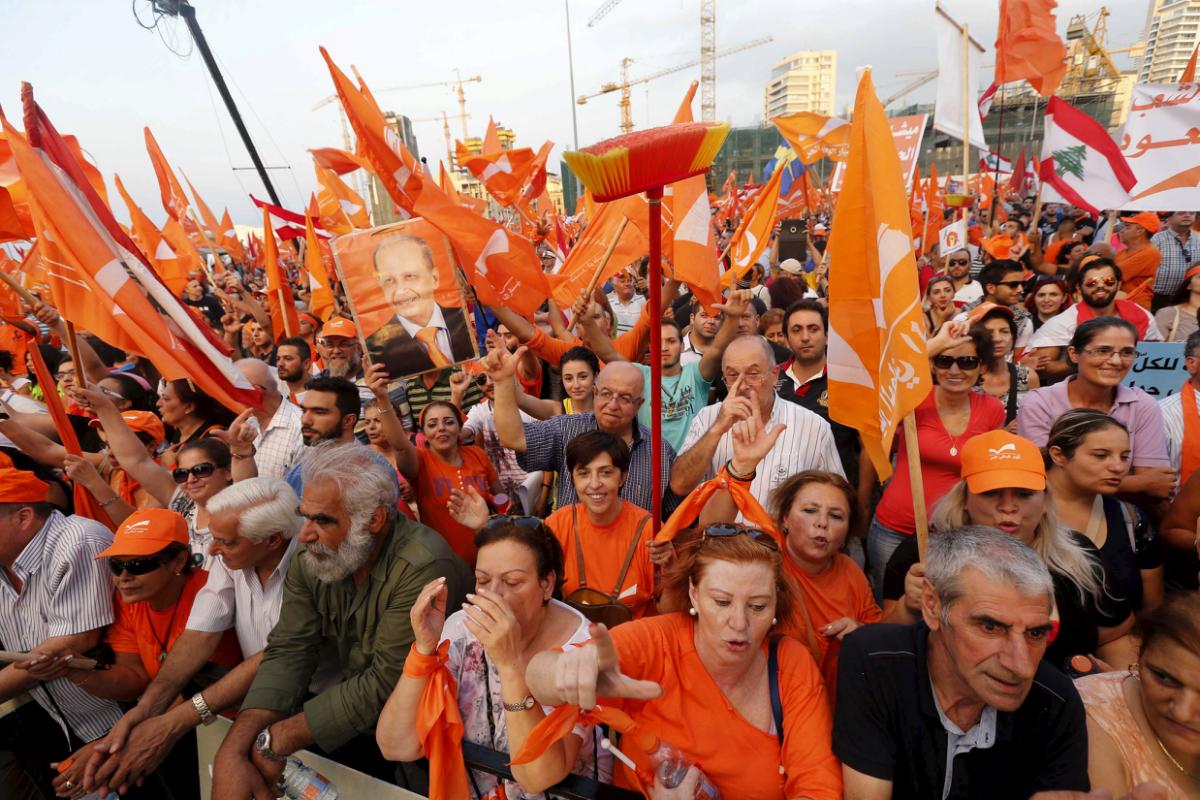
Supporters of the Free Patriotic Movement (FPM) carry flags and a broom stick during a protest in Beirut, Lebanon, September 4, 2015. Thousands of protesters rallied in Beirut on Friday to support a leading Christian politician’s call for a presidential election, in the midst of a political crisis that has paralysed the government and parliament. REUTERS/Mohamed Azakir
United Nations Secretary General Ban Ki-moon condemned this weeks' violence and was concerned by the delay to the election. His comments were echoed by the U.S. government, which has supported the fraught election to the tune of $30 million.
"The United States supports all efforts aimed at finding consensual and constructive solutions that will conclude the electoral process with an outcome that reflects the will of the people," a State Department spokeswoman said.
Политика конфиденциальности | Правила пользования сайтом







